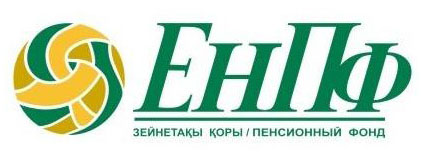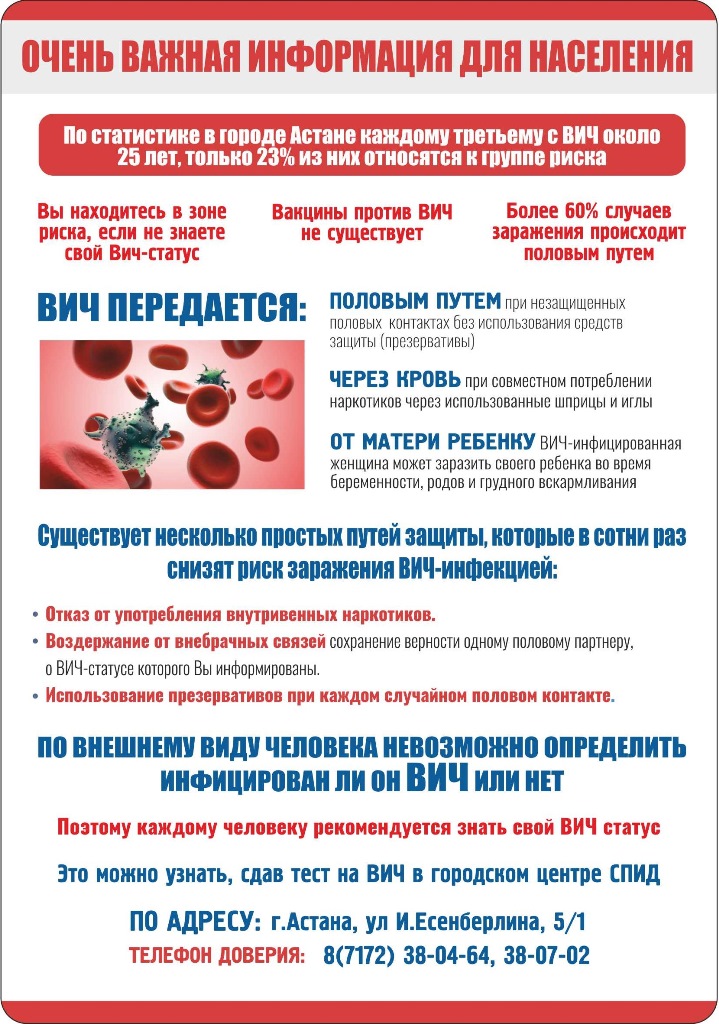HIV testing
When and who gets tested for HIV
Citizens of the Republic of Kazakhstan and oralmans have the right to voluntary, anonymous and / or confidential medical examination and counselling for HIV free of charge.
However, there is a category of persons who are subject to mandatory confidential medical examination for the presence of HIV infection. They are the donors and recipients of blood components, tissues and / or organs or (parts of organs), germ cells, the person in respect of whom there are reasonable grounds to believe the possibility of HIV infection, based on the requests of the health authorities, prosecution, investigation and trial, as well as those in clinical and epidemiological evidence.
What is meant by clinical indications for the examination?
There are so-called opportunistic diseases, as well as a number of syndromes and symptoms, which suggests about the immune deficiency or possible HIV infection. These diseases are clinical indications for mandatory examination to exclude or confirm the diagnosis of HIV infection.
Under epidemiological indications include situations arising in a particular area, among certain groups of the population and epidemiologic investigation of each case of HIV infection. Examination of the epidemiological evidence subject to:
o those who were in sexual contact with HIV - infected or AIDS patients;
o people who had contact "on the needle", i.e. joint injecting drug use;
o injecting drug users during the registration at the narcological service and every 6 months;
o people practicing promiscuity, including sex workers and men having sex with men;
o people enrolled in SI, detention centers, correctional institution at admission and after 6 months after receipt and before release. In addition, they can be examined at the request of the period of stay in the institution;
o the children who were born from HIV – infected and patients AIDS of mothers;
o people who were affected by an emergency in the performance of official duties, former professional contact with HIV or high probability of such contact (workers ambulance crews, emergency, police, etc) who have experienced sexual violence - pass a medical examination at the time of treatment in the future after 1 and 3 months;
o the health workers working with HIV - infected material - at revenues to work and further once a year;
o people who were called up for military service, contract service, students of military educational institutions;
o pregnant women who decide to continue the pregnancy must pass 2-fold inspection:
1) at registration in W/K;
2) in the period of 28-30 weeks of pregnancy;
o women who wish to terminate a pregnancy, it is also necessary are screened for HIV;
o pregnant women enrolled in maternity institutions without the results of the 2 - fold of HIV testing or surveyed 1-fold, but more than 3 weeks prior to childbirth, necessarily examined in the hospital.
How is laboratory diagnostics for HIV, how to prepare for the analysis
To learn about the presence or absence of HIV infection can only be passed laboratory tests, i.e., to undergo HIV testing.
The HIV test is a laboratory method for testing of human blood for antibodies to HIV. Using the routine analyses revealed no HIV itself, and total antibodies to it - witness the invasion of the virus. HIV antibodies are produced in the body in defined quantities not immediately, but some time later, after the invasion of the virus. HIV tests based on the detection of antibodies become positive 2-3 weeks after infection, in rare cases, this period is delayed up to 6 months on average 3 months. It was during this period of time there are extremely high levels of viral load, and therefore the highest chance of HIV transmission!
It is therefore very important not to delay the time to overcome the fear to know their HIV status. This requires only Your decision about taking the test.
The blood test is carried out in the laboratory of the Centre for the AIDS enzyme-linked immunosorbent assay (ELISA). The procedure of drawing blood is painless and safe.
Blood sampling is carried out in the conditions of the treatment room, from the cubital vein in a special sterile vacutainer, 5 ml.
Blood can be taken in the morning on an empty stomach, and at any time of the day after a meal.
The result of inspection is told to the examined person personally during posttest psychosocial consultation. Results of the analysis aren't given by phone.
Can I get HIV during examination
Unfortunately, fear of HIV infection at delivery of the analysis, is another reason for some people suffering from fear to know their HIV status. This is largely due to ignorance.
In medical institutions for blood analysis uses only disposable instruments. Sterile disposable vacutainer mentioned above, represent a closed system and is completely safe. When giving blood HIV impossible.
Testing of minors and incapacitated persons
Examination of minors and incapacitated persons for the presence of HIV infection is carried out with the consent of their parents or legal representatives.
The survey results of minors and incapacitated persons are given to their parents or other legal representatives.
The interpretation of the results
If the result of the survey of antibodies to HIV is not found, then the test result is negative, i.e., the person is not infected, healthy. If the survey found HIV antibody, then the test result is positive, i.e., a person has HIV infection.
Only laboratory of the Republican AIDS centre (in Almaty) gives the conclusion about the presence of HIV antibodies, respectively, about the human infection HIV, where the analysis will be sent for precontrol. In the case of a positive result, you must immediately contact a doctor in infectious AIDS Centre for the qualified medical aid. The doctor of the AIDS center shall notify in writing the subject of a positive result for HIV infection, the need for safety precautions in order to safeguard their own health and the health of others, and warns about the administrative and criminal liability for evasion of treatment and infection of other people addressed the issue of his medical examination and necessary treatment.
Another version of the study, rare - doubtful. This can be in two cases: when a person has recently been exposed to HIV and to detect conventional test systems, the antibody concentration is insufficient, or when HIV is absent, but there are other chronic diseases - metabolic or autoimmune in nature. When questionable results, a repeat examination within 1-3 months.
Anonymity and confidentiality
The anonymity and confidentiality of the fact of appeals for medical care are guaranteed by paragraph 1 of article 95 of the code of the Republic of Kazakhstan «On people's health and healthcare system» dated 18.09.2009, No. 193-IV
«Information about the health status of a citizen, the diagnosis of his disease, and other information which was obtained during the examination and / or treatment are strictly confidential». According to p. 6, Art. 182 of this Code, health care workers are obliged to maintain confidentiality.
Rapid testing
Currently, there is a method of rapid testing or rapid detection of antibodies to HIV. This test is painless puncture the skin of the finger, with a special pen-needle. A drop of capillary blood is applied to the test strip, which for 20 minutes shows the result. However, it should be noted that the results of the rapid test must be confirmed in solid-phase EIA.
Help certificate output
Some countries permit the entry/visa requirements in those or other purposes, require the certificate of absence of HIV. The issuance of help certificates confirming the negative results of the survey for antibodies to HIV, is performed by the regional centres for the prevention and control of AIDS in the presentation of a document certifying the identity within 3 working days from receipt of the biomaterial examined in the laboratory. Help certificate is valid for 3 months from the date of its issuance.
Where you can get tested for HIV
You can get tested for HIV in the AIDS Center at the address:Astana, Yesenberlin str., 5/1, from 9.00 to 18.00 hours (lunch break 13.00-14.00, closed: Saturday, Sunday) or any other medical institution of the city.
In medical organizations in the blood of the examined HIV is carried out in individuals surveyed in clinical and epidemiological evidence, with further delivery of biomaterial samples in the AIDS Center.
In the Centre of the AIDS blood sampling is carried out in individuals exposed to HIV infection, sexual partners of HIV-infected and AIDS patients, partners for co-injecting drug users, persons that require help certificate.


